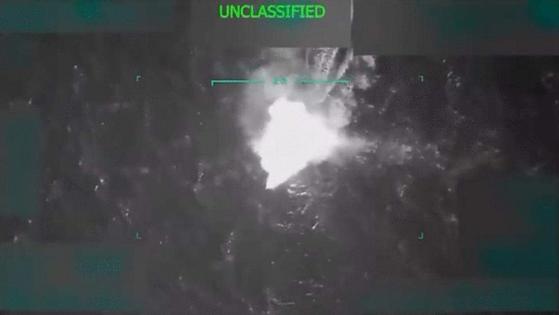US strike off Venezuelan coast kills six in Trump's expanding 'narcoterror' campaign
Published in News & Features
President Donald Trump said Tuesday that U.S. forces carried out another deadly strike in the Caribbean, hitting a vessel off the coast of Venezuela that he described as affiliated with a “Designated Terrorist Organization” involved in narco-trafficking.
In a post on Truth Social, Trump said the strike was conducted “under (his) Standing Authorities as Commander-in-Chief” and ordered by Defense Secretary Pete Hegseth. According to the president, six “male narcoterrorists” aboard the vessel were killed and no U.S. forces were harmed.
“Intelligence confirmed the vessel was trafficking narcotics, was associated with illicit narcoterrorist networks, and was transiting along a known” trafficking route, Trump wrote, adding that the strike took place “in International Waters, just off the Coast of Venezuela.”
The attack marks the sixth U.S. strike in the Caribbean in recent months as the Trump administration intensifies its campaign to target what it describes as narcoterrorist operations along established smuggling routes. With Tuesday’s strike, the campaign’s death toll now stands at 27.
Trump has repeatedly said such networks pose a direct threat to U.S. national security and has characterized the strikes as lawful military actions under his executive authority.
The operation comes amid a major U.S. military buildup in the Caribbean, which Venezuela’s government has denounced as an act of aggression.
Venezuelan Defense Minister Vladimiro Padrino, speaking last week in a televised address to military leaders, accused Washington of using “false” drug-trafficking allegations as a pretext for “regime change.”
“We have to prepare ourselves because the irrationality with which the U.S. empire operates is not normal,” Padrino said. “It’s anti-political, anti-human, warmongering, rude, and vulgar.”
Padrino also rejected Washington’s characterization of the U.S. naval deployment as “propaganda-like,” warning instead of a potential military escalation near Venezuelan waters.
The latest strike is part of what U.S. officials say is an effort to dismantle drug trafficking networks with deep ties to the Venezuelan government. American intelligence agencies have long claimed that senior members of Nicolás Maduro’s regime are connected to the so-called Cartel de los Soles, an organization accused of managing large-scale cocaine shipments from Venezuela to North America and Europe.
The administration has justified its recent actions in a memo to lawmakers, some of whom have raised concerns about executive overreach and the legality of treating suspected traffickers as combatants. The administration memo, obtained by several news outlets, declared that drug cartels are “unlawful combatants” and asserted that the United States is engaged in a “non-international armed conflict” with them.
The strikes, which began early last month, followed the launch of the largest U.S. military deployment in the Caribbean in decades, aimed at disrupting regional drug operations. The initial phase of the mission includes a Marine air-ground task force aboard the amphibious assault ship USS Iwo Jima and two San Antonio-class transport ships, with more than 2,000 Marines prepared for rapid-response missions.
In total, over 4,500 U.S. personnel — Marines and Navy — are operating in the region, supported by a cruiser, several destroyers and a Los Angeles-class attack submarine armed with precision-guided missiles. Ten F-35 stealth fighters are also stationed in Puerto Rico, giving the United States overwhelming air superiority over Venezuela’s aging fleet of Sukhoi Su-30s and F-16s.
The administration has increasingly fused its war on drugs with counterterrorism policy, labeling transnational cartels as “narco-terrorist” entities rather than criminal organizations. Officials argue that the approach gives Washington greater legal and military latitude to strike at foreign groups involved in narcotics smuggling.
The move, however, has drawn criticism from legal experts and some members of Congress, who warn it could blur the line between law enforcement and war — and risk deeper confrontation with adversarial regimes in the hemisphere.
_____
©2025 Miami Herald. Visit miamiherald.com. Distributed by Tribune Content Agency, LLC.







Comments